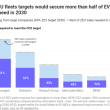The European Bank for Reconstruction and Development (EBRD), the African Development Bank (AfDB), and British International Investment (BII) have jointly committed US$479.1 million to support the development of Egypt’s largest integrated solar and battery energy storage project to date.
The funding will be directed to Obelisk Solar Power SAE, a special-purpose vehicle owned by Norwegian renewable energy developer Scatec ASA. The project will deliver a 1.1 GW solar photovoltaic (PV) plant and a 200 MWh battery energy storage system (BESS) in the Nagaa Hammadi region of Upper Egypt. Total investment costs are estimated at US$590 million, with blended finance covering approximately 80 per cent of the total capital expenditure.
The EBRD will contribute a loan of up to US$173.5 million, including US$101.9 million under the European Fund for Sustainable Development Plus (EFSD+) guarantee for the first 18 years, alongside a US$6.5 million grant from the Bank’s Shareholder Special Fund.
The AfDB has approved a US$184.1 million financing package comprising US$125.5 million from its ordinary capital resources and concessional contributions from its Sustainable Energy Fund for Africa (US$20 million), the Canada-AfDB Climate Fund (US$18.6 million), and the Clean Technology Fund (US$20 million).
BII will provide a US$100 million concessional loan and a US$15 million returnable grant to support the battery component, aiming to reduce project costs and catalyse private sector involvement.
The project, to be delivered in two phases, will see 561 MW of solar capacity and 100 MW/200 MWh of battery storage operational by mid-2026, with an additional 564 MW of solar to come online in the latter half of the year. Electricity generated will be sold under a 25-year, US dollar-denominated power purchase agreement with the Egyptian Electricity Transmission Company, guaranteed by the state.
Upon completion, the Obelisk project will be the first of its scale in Egypt to integrate utility-scale battery storage, positioning the country to meet its target of 42 per cent renewable energy in its electricity mix by 2030. It is expected to generate 3,000 GWh annually and reduce carbon dioxide emissions by up to 1.4 million metric tonnes per year.
Key stakeholders hailed the project as a milestone in Egypt’s energy transition. EBRD Managing Director for Sustainable Infrastructure Harry Boyd-Carpenter called it “a transformative step” in leveraging solar power “not just during the day but also at night.” AfDB’s Wale Shonibare emphasised its replicability across the continent, while BII’s Iain Macaulay noted it would “set a precedent” for future hybrid energy projects in the region.
Scatec CEO Terje Pilskog called the initiative a demonstration of the company’s ability to deliver large-scale hybrid renewables, while Egypt’s Minister of International Cooperation, Rania Al-Mashat, said the project reflected the country’s commitment to its Nexus of Water, Food and Energy (NWFE) platform and to attracting private capital into green infrastructure.
The announcement also marked the EU’s launch of the EU-Egypt Investment Guarantee for Development Mechanism, which aims to unlock large-scale financing for sustainable projects in Egypt. The mechanism played a key role in enabling EBRD’s loan contribution to the Obelisk initiative.
Since launching operations in Egypt in 2012, the EBRD has invested over €13.3 billion in 202 projects, spanning financial services, infrastructure, agribusiness, manufacturing, and transport.













